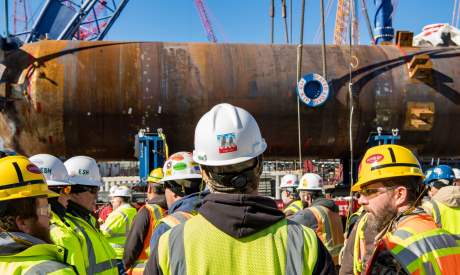CORRECTED: The original version of this story gave an incorrect figure for the value of nuclear tax credits under the 2005 Energy Policy Act.
The USA has extended production tax credits for advanced nuclear power plants under a budget bill signed into law by President Donald Trump. The nuclear production tax credit is seen as an essential component for the completion of US plants already under construction and for first-of-a-kind small modular reactor (SMR) construction.
 |
| Workers at Vogtle are briefed before the installation of unit 3's pressuriser in January - a key milestone for the project (Image: Georgia Power) |
HR 1892 - the Bipartisan Budget Act of 2018 - was passed by the US Senate and Congress in the early hours of 9 February and signed into law by the President later the same day, ending a brief government shutdown. The act, which includes defence and domestic spending with funding for healthcare and infrastructure, gained bipartisan support in both houses.
Nuclear production tax credits were created under the 2005 Energy Policy Act to provide federal support for projects such as Georgia Power's Vogtle units 3 and 4. The credit was set at 1.8 cents per kilowatt-hour of electricity over eight years, subject to limitations. To be eligible for the credit, plants were required to enter commercial operation by the end of 2020; however the Vogtle plants are not expected to enter service until November 2021 (unit 3) and November 2022 (unit 4).
Section 40501 of the new law allows reactors entering service after 31 December 2020 to qualify for the tax credits, and enables the US Energy Secretary to allocate credits for up to 6000 MWe of new nuclear capacity which enters service after 1 January 2021. It also allows public entity partners in the projects - such as Vogtle's minority owners Oglethorpe Power, MEAG Power and the city of Dalton - to transfer their credits to other credit partners.
The 2021 deadline means that the two Vogtle units will be eligible for the tax credits. Other projects, such as NuScale Power's plans to build its first commercial SMR plant at the Idaho National Laboratory by 2026, will also now be able to benefit.
Georgia Power's recommendation to continue with the construction of the two AP1000 reactors at Vogtle, following contractor Westinghouse's Chapter 11 bankruptcy filing in March last year, received approval from the state's public service commission in December.
Federal support and "constructive legislation" continue to be an important key to the project's success, the company said. The new law further reduces the risk for the continuing construction of the units, for which the company also holds more than $5 billion in anticipated loan guarantees from the Department of Energy.
The company praised members of Congress for voting to approve the legislation to extend the tax credits deadline, led by Senator Johnny Isakson.
"We are grateful to Senator Isakson for his leadership on this issue, and to the entire Georgia delegation for recognising the importance of new nuclear generation and demonstrating renewed federal support for the Vogtle project," he said. "At Georgia Power, we are focused on delivering value to our customers every day and we're committed to completing these new units."
Maria Korsnick, president and CEO of the US Nuclear Energy Institute, said the vote was "a vote for continued American leadership in nuclear energy, environmental stewardship and thousands of jobs", with tax credits supplying an essential component to complete construction of the Vogtle plant and also paving the way to build NuScale's Idaho SMR.
"Both projects will serve as anchors for energy infrastructure … as they generate carbon-free electricity, spur economic growth and support a diverse and reliable electric grid for decades to come," she said.
Researched and written
by World Nuclear News




_730_93825.jpg)

_83147.jpg)
_87299.jpg)






